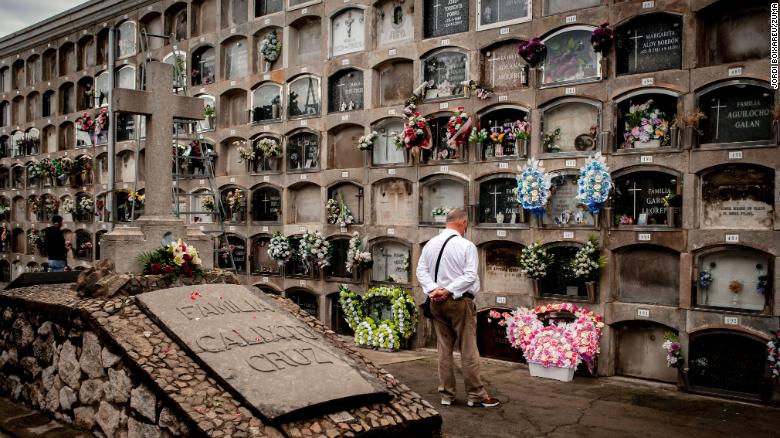November 1, 2021, Barcelona, Spain: A man stands in front of graves decorated with flowers at the Poblenou cemetery of Barcelona.
November 01 is the Catholic holiday of All Saints, which is dedicated to the memory of the deceased.
(Credit Image: ? Jordi Boixareu/ZUMA Press Wire)
(CNN) --
Every year on November 1, many Roman Catholics and other Christians around the world celebrate All Saints' Day, which honors all the saints of the Church who are considered to have made it to heaven.
In the Orthodox Church, All Saints' Day is celebrated on the first Sunday after Pentecost.
Here is an overview of the history and traditions of this religious holiday.
Where does All Saints' Day come from?
Although now celebrated in November, All Saints' Day was originally celebrated on May 13, but the origin cannot be traced with certainty, according to the Encyclopedia Britannica.
Pope Boniface IV formally initiated what would later become known as All Saints' Day on May 13 in the year 609, when he dedicated the Pantheon in Rome as a church in honor of the Virgin Mary and all martyrs.
The current date of November 1 was established by Pope Gregory III during his tenure (731-741) when he dedicated a chapel in St. Peter's Basilica in Rome in honor of all the saints.
Although initially this celebration was limited to Rome, later, in the year 837, Pope Gregory IV ordered the official observance of All Saints' Day every November 1 and extended its celebration to the entire Church.
All Saints really means ALL Saints
While many canonized saints are celebrated with their own individual feast days (such as Saint Patrick), saints who have not been canonized do not have a particular celebration.
advertising
All Saints' Day recognizes those whose holiness only God knows.
Still, Catholic celebrations tend to focus on well-known saints, those canonized by the Catholic Church.
A sacred obligation
According to Catholic Online, within the Catholic Church, All Saints' Day is generally considered a Holy Day of Obligation, meaning that all Catholics are required to attend Mass unless impeded by illness or other suitable excuse.
However, mass is not compulsory in 2021 because the feast falls on a Monday.
Whenever November 1 falls on a Monday or Saturday, Catholics are encouraged to attend Mass, but it is not required.
After the Protestant Reformation, many of the Protestant groups continued to celebrate All Saints' Day.
Methodists, for example, recognize it as a day to sincerely thank God for the lives and deaths of the saints, according to Christianity.com.
celebrations around the world
Although it is not a public holiday in the United States, All Saints' Day is officially celebrated in many countries.
In France and Germany, people have the day off and businesses are closed.
In countries like the Philippines, where All Saints' Day is known as "Undas," the day is not just to remember the saints, but to honor and remember deceased loved ones, usually with prayers, flowers, and good offerings.
All Saints Day

